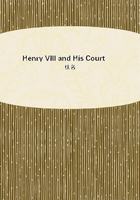
第16章 THE RIVALS.(1)
At the very moment when the king was pronouncing, in a voice almost exultant, Anne Askew's sentence of death, one of the king's cavaliers appeared on the threshold of the royal chamber and advanced toward the king.
He was a young man of noble and imposing appearance, whose lofty bearing contrasted strangely with the humble and submissive attitude of the rest of the courtiers. His tall, slim form was clad in a coat of mail glittering with gold; over his shoulders hung a velvet mantle decorated with a princely crown; and his head, covered with dark ringlets, was adorned with a cap embroidered with gold, from which a long white ostrich-feather drooped to his shoulder. His oval face presented the full type of aristocratic beauty; his cheeks were of a clear, transparent paleness; about his slightly pouting mouth played a smile, half contemptuous and half languid; the high, arched brow and delicately chiselled aquiline nose gave to his face an expression at once bold and thoughtful. The eyes alone were not in harmony with his face; they were neither languid like the mouth, nor pensive like the brow. All the fire and all the bold and wanton passion of youth shot from those dark, flashing eyes. When he looked down, he might have been taken for a completely worn-out, misanthropic aristocrat; but when he raised those ever-flashing and sparkling eyes, then was seen the young man full of dashing courage and ambitious desires, of passionate warmth and measureless pride.
He approached the king, as already stated, and as he bent his knee before him, he said in a full, pleasant voice:
"Mercy, sire, mercy!"
The king stepped back in astonishment, and turned upon the bold speaker a look almost of amazement.
"Thomas Seymour!" said he. "Thomas, you have returned, then, and your first act is again an indiscretion and a piece of foolhardy rashness?"The young man smiled. "I have returned," said he, "that is to say, Ihave had a sea-fight with the Scots and taken from them four men-of-war. With these I hastened hither to present them to you, my king and lord, as a wedding-gift, and just as I entered the anteroom Iheard your voice pronouncing a sentence of death. Was it not natural, then, that I, who bring you tidings of a victory, should have the heart to utter a prayer for mercy, for which, as it seems, none of these noble and proud cavaliers could summon up courage?""Ah!" said the king, evidently relieved and fetching a deep breath, "then you knew not at all for whom and for what you were imploring pardon?""Yet!" said the young man, and his bold glance ran with an expression of contempt over the whole assembly--"yet, I saw at once who the condemned must be, for I saw this young maiden forsaken by all as if stricken by the plague, standing alone in the midst of this exalted and brave company. And you well know, my noble king, that at court one recognizes the condemned and those fallen into disgrace by this, that every one flies from them, and nobody has the courage to touch such a leper even with the tip of his finger!"King Henry smiled. "Thomas Seymour, Earl of Sudley, you are now, as ever, imprudent and hasty," said he. "You beg for mercy without once knowing whether she for whom you beg it is worthy of mercy.""But I see that she is a woman," said the intrepid young earl. "And a woman is always worthy of mercy, and it becomes every knight to come forward as her defender, were it but to pay homage to her sex, so fair and so frail, and yet so noble and mighty. Therefore I beg mercy for this young maiden!"Catharine had listened to the young earl with throbbing heart and flushed cheeks. It was the first time that she had seen him, and yet she felt for him a warm sympathy, an almost tender anxiety.
"He will plunge himself into ruin," murmured she; "he will not save Anne, but will make himself unhappy. My God, my God, have a little compassion and pity on my anguish!"She now fixed her anxious gaze on the king, firmly resolved to rush to the help of the earl, who had so nobly and magnanimously interested himself in an innocent woman, should the wrath of her husband threaten him also. But, to her surprise, Henry's face was perfectly serene and contented.
Like the wild beast, that, following its instinct, seeks its bloody prey only so long as it is hungry, so King Henry felt satiated for the day. Yonder glared the fires about the stake, at which four heretics were burned; there stood the scaffold on which the Countess of Somerset had just been executed; and now, within this hour, he had already found another new victim for death. Moreover, Thomas Seymour had always been his favorite. His audacity, his liveliness, his energy, had always inspired the king with respect; and then, again, he so much resembled his sister, the beautiful Jane Seymour, Henry's third wife.